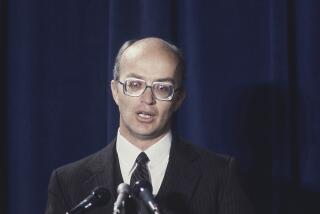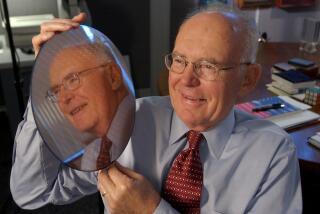PEOPLE : Ex-IBM Chief Admits He Felt Big Pressures : Management: Thomas Watson Jr., who led the firm into computers, says he once feared he couldn’t fill the shoes of his predecessor--his father.
- Share via
NEW YORK — Many sons of famous corporate tycoons who take over the family business do so with trepidation. Thomas J. Watson Jr., son of longtime IBM Chairman Thomas J. Watson, was no different.
“I’d heard so many stories about sons of prominent men failing in business, and I could imagine their devastation at finding themselves unable to fill their fathers’ shoes. I worried I’d end up the same way,” Watson writes in his autobiography, “Father, Son & Co.,” which goes on sale today.
Needless to say, Watson did not fail.
Watson’s father had transformed International Business Machines Corp. from an obscure tabulating machine company to a worldwide powerhouse before he turned over control to his son in 1956. He died a few months later at age 82.
Watson Jr. furthered IBM’s growth, leading it into the age of computers--an area his father originally shied away from.
The book, co-authored with a Fortune magazine editor, Peter Petre, provides a rare firsthand account of the coming of age of a chief executive and his company. Central to the story is the tense relationship between Watson and his larger-than-life father.
“In public he would praise me lavishly,” the 76-year-old Watson writes. “But in private father and I had terrible fights that led us again and again to the brink of estrangement.”
Watson left IBM in 1971 after suffering a heart attack at age 56. He later served as U.S. ambassador to the Soviet Union and remains IBM’s chairman emeritus. He said in a telephone interview that writing the book has allowed him to relive his life and to clarify his relationship with his father.
“It’s a love story. It is a story of a son who was terribly, terribly fond of his father. But the son didn’t know how to express it,” Watson said in the interview.
“He was the greatest man I ever knew.”
Among the book’s insights into Watson Sr.:
* He ran IBM along the lines now associated with Japanese companies. Employees sang company songs and recited company slogans. Watson’s favorite motto, “THINK,” was emblazoned on posters and company newspapers, along with Watson’s picture. But Watson’s son worried that his father was creating a personality cult.
* Watson Sr. believed that you got the best out of employees by treating them with respect. “IBM offered the best benefits money could buy,” his son writes, including education and company country clubs. However, he was tough with IBM’s managers, often badgering them with obscure questions about IBM’s operations.
In the book, Watson Jr. describes himself as an aimless, spoiled youth who partied his way through Brown University while barely keeping his grades high enough to keep from being expelled.
Watson decided to join IBM after college, despite having little idea what he wanted to do with his life. He went through IBM’s sales training program, where he first became painfully aware of how hard it was to be the boss’ son.
On his first sales call, a corporate executive gave him a lecture on the difficulty of following his father’s footsteps. He told of one such young man who became a drunk from too much high living and was fired by his father.
“I was tempted to abandon my IBM career on the spot,” Watson writes.
But he persevered and rose to become IBM’s top salesman after a lucrative account was added to his sales territory to make him look good. The achievement won him headlines in the company newspaper. “I felt demeaned,” Watson writes. “Everyone knew that I was the old man’s son, and that otherwise I never could have sold so much in such a short time.”
Watson escaped the pressures of IBM and his father for several years by flying for the Air Force during World War II. But at the war’s end, he decided to return to his father’s company.
Watson rose quickly and was named president in 1952. But he never escaped the heavy hand of his father as IBM entered a period of explosive growth.
“I don’t think my father realized how far he was pushing me,” Watson writes. “There were times when I wondered if I was going to have a nervous breakdown.”
In 1956, Watson was preparing to sail in a yacht race when he was called back to New York. His father was in the hospital and soon died.
Watson ran the company on his own for five years. But in 1961, he relinquished the job of president to prepare for an eventual successor. He kept the job of chief executive and also became chairman.
That period led to what Watson Jr. calls the biggest mistake of his life. Watson believed that his younger brother, Dick, who was in charge of IBM’s international operations, would be his natural successor as chief executive. But instead of preparing Dick for the job outright, he set him up in a competition with other executives.
Dick Watson ran into trouble during the launch of a computer line that was crucial to IBM’s future. The project was severely behind schedule. Watson decided his brother just couldn’t handle the job and gave it to another executive. That put Dick Watson out of the running for president.
More to Read
Sign up for our Book Club newsletter
Get the latest news, events and more from the Los Angeles Times Book Club, and help us get L.A. reading and talking.
You may occasionally receive promotional content from the Los Angeles Times.








